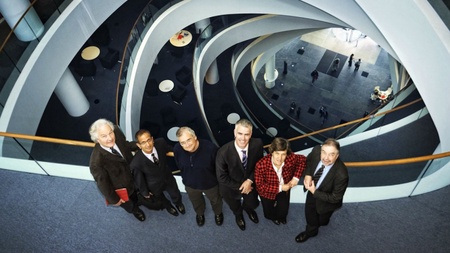A new company formed to commercialise 'artificial intelligence' technology developed at the University of Aberdeen has become the latest 'big technology' story for the UK's financial media.
University spin-out Data2Text was acquired by commercialisation specialist Arria earlier this year. The resulting company Arria NLG floated at the end of November on the Alternative Investment Market and is currently valued at £150 million.
Professor Ehud Reiter and Dr Yaji Sripada in the University’s School of Computing Science joined forces with entrepreneurs Ian Davy and John Perry to start Data2Text four years ago to take forward research in Natural Language Generation (NLG).
Global industries need to capture, process, understand and use an increasing amount of ‘big data’. NLG is a form of artificial intelligence developed to communicate information extracted from complex data sources in natural language, automatically generating written reports in potentially any language.
The Arria NLG Engine which automatically communicates results, not in numbers or graphics that require further analysis and explanation, but in narratives that are designed to read as if written by a human expert.
The technology is already being used by the UK’s Meteorological Office to generate high quality text for weather forecasts. A global oil and gas supermajor is also using the Arria NLG Engine to process a vast amount of data from production platforms in deepwater Gulf of Mexico and convert it in real time to the language that an operator or engineer speaks.
The scientific foundation for the Arria NLG Engine has been developed over the past four years, but is based on more than 20 years of research and knowledge gained by the Data2Text founders at the University of Aberdeen. The company currently has 17 staff based on the King’s College campus.
Professor Sir Ian Diamond, Principal and Vice-Chancellor of the University of Aberdeen, said: “This is another example of the excellent research at the University of Aberdeen being translated into a successful business. The University is delighted that the scientists in the NLG group and their business partners who created Arria NLG are floating on the AIM.”
Scientist and entrepreneur Ian Davy led the spin-out through its formative years. He said “Watching the science develop through my academic colleagues it became clear that when we had an oil and gas supermajor wanting to apply our technology in 2009, we had to spin out a company from the University of Aberdeen. With the business going public, and the quality of the team we have put together, the future looks very exciting indeed.”
Professor Ehud Reiter said “As an academic researcher, I got into this area because I wanted to understand how language relates to the real world; for example, what does “red” mean in terms of actual light wavelengths, and when does it make sense to describe a shark as a “dangerous fish”?
“Over the years I’ve worked on many research projects which have raised questions such as whether (for ordinary people, not dictionary writers) “grammar mistakes” include spelling errors, and whether the time we call “by evening” depends on sunset time. It’s fantastic for me to see an endeavour which started off as an almost philosophical investigation turning into a successful company which is now listed on AIM.
“The company’s goal is to build ‘articulate machines’ which communicate with people in the same way that other people do. When two engineers or doctors communicate, they may share numbers and graphs, but the core of the communication will be in language, and our goal is to enable articulate machines to communicate in exactly the same way. To do this, we combine artificial intelligence technology (which analyses the data and identifies the most important information for the recipient user) and computational linguistics technology (which transforms the selected key information into sentences in English or other languages). Plus of course a lot of software engineering to ensure that the system is reliable and robust.”


